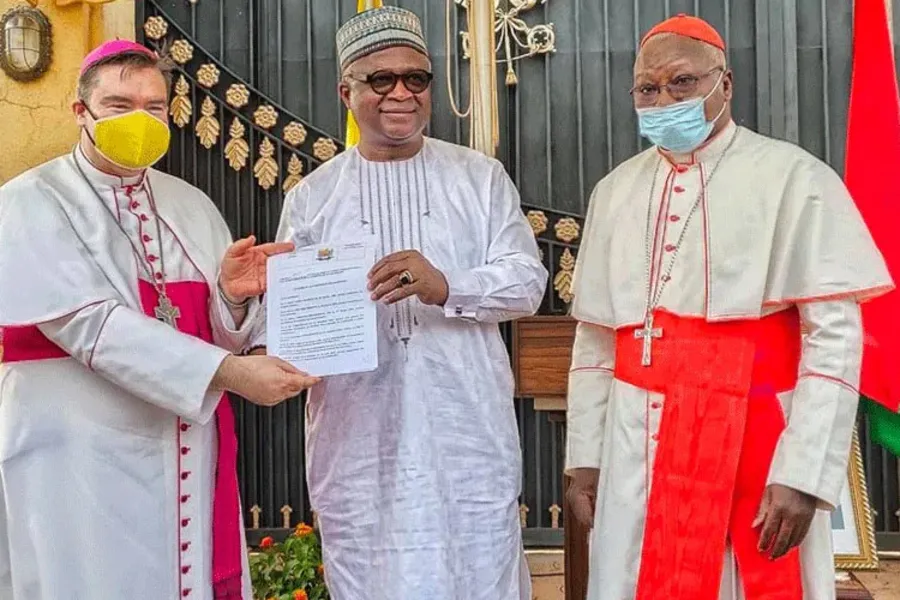A cardinal in Burkina Faso said that the naming of a street after Pope Emeritus Benedict XVI brought “hope” to the country, Africa, and the world.
Cardinal Philippe Ouédraogo spoke at a June 13, 2021, ceremony unveiling the newly named Rue Pape Benoît XVI (Pope Benedict XVI Street) in the capital, Ouagadougou.
The thoroughfare was previously called street 54.160, reported ACI Africa, CNA’s African news partner. It is the location of the country’s apostolic nunciature.
At the ceremony, Cardinal Ouédraogo described Benedict XVI as a great pastor whose name “brings hope to Burkina Faso, to Africa, and to the world and promotes the spirit of dialogue, reconciliation, justice, and peace in the hearts of all people.”
Pope Benedict XVI died Dec. 31, 2022, at age 95. He served as pope from 2005 until his retirement in 2013.
“Let us make this street a place where peace awakens faith,” the archbishop of Ouagadougou said at the ceremony.
Archbishop Michael Crotty, the apostolic nuncio in Burkina Faso and Niger, said at the ceremony that the naming of the street was “a sign of gratitude to the pope, ... who established the apostolic nunciature in Ouagadougou on June 12, 2007, and on the same day appointed Archbishop Vito Rallo as the first apostolic nuncio resident in the country.”
Burkina Faso is a landlocked country in West Africa with a population of 20 million people, approximately 19% of whom are baptized Catholics.
The Irish-born nuncio thanked the Ouagadougou city council for the honor bestowed on the pope emeritus, adding that the street was also significant because “the rectorate of the Catholic University of West Africa (UCAO) is also located on Benedict XVI Street.”
“I am personally pleased that from now on the headquarters of UCAO will bear in its address the name of Pope Benedict XVI, known for his intelligence and intellectual strength, as well as for his dedication to the search for truth,” he said.
Archbishop Crotty explained that having a diplomatic mission was both a statement and a commitment “to deepen and strengthen bilateral relations, and there is no better way to do so than to be physically present.”
“Indeed, in the nine months since my arrival here in Burkina Faso, the greatest joy for me in being Pope Francis’ representative is to make him present wherever I go, a presence made possible by Pope Benedict XVI, who established this diplomatic mission of the Holy See to Burkina Faso and Niger here in Ouagadougou,” he commented.
“I hope that these links between us will bear fruit in favor of peace and reconciliation for our world,” he said.
As pope, Benedict XVI visited Burkina Faso’s neighbor, Benin, in 2011 but did not travel to Burkina Faso.
Armand Béouindé, the mayor of Ouagadougou, at the June 2021 ceremony described Benedict XVI as “a man who has always worked for reconciliation between peoples, for interreligious dialogue, and for faith.”
“The renewal of the identity of this street will further implant in the collective memory of our population the name of an eminent personality that is Pope Benedict XVI,” he said.
Béouindé added that Benedict XVI “not only allowed the establishment of a strong diplomatic relationship between Burkina Faso and the Holy See, but also it is thanks to him that the apostolic nunciature was built in 2007.”
The mayor said that his administration heeded the request of the pope’s representative in the country “to name the street in front of the main gate of the nunciature, which also houses the rectorate of the Catholic university, to be Pope Benedict XVI Street.”


